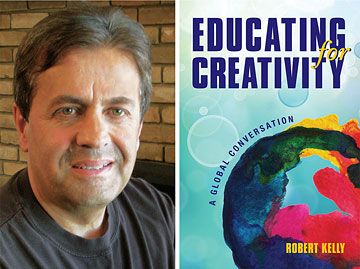Local author promotes creativity for empowering learners
COFFEE WITH WARREN, with Warren Harbeck
Cochrane Eagle, February 20, 2013

Robert Kelly’s latest book, Educating for Creativity, addresses the importance of innovation and design thinking for the broad spectrum of learning and life. Photo at left by Warren Harbeck; cover image supplied
In his just-published book, a widely acclaimed author/lecturer sees hope for the world by a shift in educational priorities from information to imagination.
Robert Kelly, PhD, of Cochrane, is an associate professor of art at the University of Calgary with a passion for creating creativity and creative teachers in the classroom.
Our genial coffee companion has long struggled with “the need for public education to move from a maniacal obsession with the consumption of information, and the teaching and assessment practices that go with it, to an educational culture of creativity that values idea generation, experimentation, design thinking, and innovation.”
But how to fulfill that need?
In Educating for Creativity: a Global Conversation Robert has compiled the views of experts from many educational contexts, early childhood to post-secondary, to provide an answer.
“Through their own creative practice as educators, they enable others to wake up every morning with a disposition to engage in a world of infinite possibilities,” he writes.
His contributors are specialists in such areas as creative educational practice, tinkering and inventing, and collaboration and “ensembling” (the conscious development of relationships).
Ian Prinsloo’s chapter, “The Essential Role of Metaphorical Thinking in Creative Practice,” especially caught my attention.
In this essay, the noted theatre director and creative inquiry facilitator builds on the classical definition of metaphor (“understanding and experiencing one kind of thing in terms of another”) to motivate “the ability to generate possibility and sustain our movement toward unknown outcomes” – or as Robert puts it, “to deal with ambiguity.”
I’ve written previously about Robert’s other contributions to art and education. In my column for Sept. 24, 2008, for instance, I featured his book, Creative Expression, Creative Education: creativity as a primary rationale for education, his call to re-engage imagination and creativity as a way of life.
Before that, in my Nov. 24, 2004 column, I celebrated Robert’s own creativity in his University of Calgary Nickle Arts Museum exhibit, “Minutia.” For that exhibit, he had created 11 books, each a guest essay on one of the decontextualized words in the 11-word phrase: “the first time I heard the sound of a page turning.” For example, there were The Book of The, The book of First, and The Book of Time.
Back to his current book, I began this week’s column with reference to the hope he sees for the world by a shift from information to imagination. And this really is what his book is all about.
“Educational practice in the Information Age has been characterized by a focus on the accumulation of data and an over-emphasis on reductive, analytical thinking,” he writes.
“The emerging Conceptual Age is driven by creativity with idea generation and experimentation as the main drivers. . . . Collaborative creativity is emerging as an essential practice for the complexities faced by future generations.”
And for the sake of those future generations, he writes, this book offers motivations and methods for “bringing creativity and design thinking into the mainstream of educational practice.”
Over coffee with Robert the other day, I asked him to summarize in one sentence his primary reason for writing this book. He immediately singled out his concern for the collective wellbeing of all humanity, and not for just the few.
This book, he said, is about “social innovation for the good of other people, not just for profit-taking.”
Educating for Creativity is available through Amazon and elsewhere.
© 2013 Warren Harbeck
JoinMe@coffeewithwarren.com